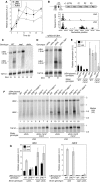Activation of the Yeast UBI4 Polyubiquitin Gene by Zap1 Transcription Factor via an Intragenic Promoter Is Critical for Zinc-deficient Growth
- PMID: 27432887
- PMCID: PMC5009263
- DOI: 10.1074/jbc.M116.743120
Activation of the Yeast UBI4 Polyubiquitin Gene by Zap1 Transcription Factor via an Intragenic Promoter Is Critical for Zinc-deficient Growth
Abstract
Stability of many proteins requires zinc. Zinc deficiency disrupts their folding, and the ubiquitin-proteasome system may help manage this stress. In Saccharomyces cerevisiae, UBI4 encodes five tandem ubiquitin monomers and is essential for growth in zinc-deficient conditions. Although UBI4 is only one of four ubiquitin-encoding genes in the genome, a dramatic decrease in ubiquitin was observed in zinc-deficient ubi4Δ cells. The three other ubiquitin genes were strongly repressed under these conditions, contributing to the decline in ubiquitin. In a screen for ubi4Δ suppressors, a hypomorphic allele of the RPT2 proteasome regulatory subunit gene (rpt2(E301K)) suppressed the ubi4Δ growth defect. The rpt2(E301K) mutation also increased ubiquitin accumulation in zinc-deficient cells, and by using a ubiquitin-independent proteasome substrate we found that proteasome activity was reduced. These results suggested that increased ubiquitin supply in suppressed ubi4Δ cells was a consequence of more efficient ubiquitin release and recycling during proteasome degradation. Degradation of a ubiquitin-dependent substrate was restored by the rpt2(E301K) mutation, indicating that ubiquitination is rate-limiting in this process. The UBI4 gene was induced ∼5-fold in low zinc and is regulated by the zinc-responsive Zap1 transcription factor. Surprisingly, Zap1 controls UBI4 by inducing transcription from an intragenic promoter, and the resulting truncated mRNA encodes only two of the five ubiquitin repeats. Expression of a short transcript alone complemented the ubi4Δ mutation, indicating that it is efficiently translated. Loss of Zap1-dependent UBI4 expression caused a growth defect in zinc-deficient conditions. Thus, the intragenic UBI4 promoter is critical to preventing ubiquitin deficiency in zinc-deficient cells.
Keywords: gene transcription; proteasome; transcription promoter; ubiquitin; yeast; zinc.
© 2016 by The American Society for Biochemistry and Molecular Biology, Inc.
Figures







References
-
- Vallee B. L., and Auld D. S. (1990) Zinc coordination, function, and structure of zinc enzymes and other proteins. Biochemistry 29, 5647–5659 - PubMed
-
- McCall K. A., Huang C., and Fierke C. A. (2000) Function and mechanism of zinc metalloenzymes. J. Nutr. 130, 1437S–1446S - PubMed
-
- Andreini C., Banci L., Bertini I., and Rosato A. (2006) Counting the zinc-proteins encoded in the human genome. J. Proteome Res. 5, 196–201 - PubMed
-
- Andreini C., Bertini I., Cavallaro G., Holliday G. L., and Thornton J. M. (2009) Metal-MACiE: a database of metals involved in biological catalysis. Bioinformatics 25, 2088–2089 - PubMed
MeSH terms
Substances
Grants and funding
LinkOut - more resources
Full Text Sources
Other Literature Sources
Molecular Biology Databases

